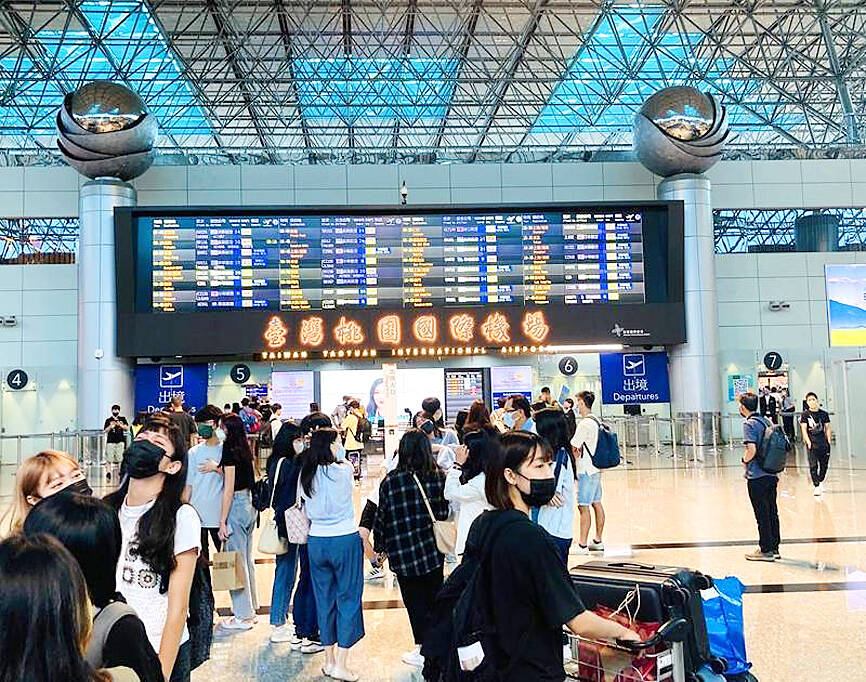The nation is expected to greet its 1 millionth international visitor of the first quarter at the end of this month, earlier than scheduled, the Tourism Bureau said.
The bureau had set a goal of attracting 820,000 international tourists during the first quarter, but it met that target faster than expected, International Affairs Division Director Huang Shih-fang (黃勢芳) said yesterday.
The Taiwan Lantern Festival and an intensive international tourism marketing campaign helped the bureau exceed its goal, bureau Deputy Director-General Trust Lin (林信任) said.

Photo: Chen Hsin-yu, Taipei Times
“We need to intensify our tourism marketing in Japan. Before the COVID-19 pandemic, Japan was our second-largest source of international tourists,” Lin said.
However, the return of Japanese tourists has not been significant, as Tokyo extended domestic travel subsidies from this month until the beginning of summer, he said.
South Korea has emerged as the largest source of international tourists so far this year, the bureau said, adding that Taiwan was already reporting a gradual increase in South Korean tourists before the COVID-19 pandemic.
From October last year to January, Taiwan has recorded 696,474 outbound tourists and 254,359 inbound visitors, bureau data showed.
Booking.com Taiwan area manager Regina Chan (詹雅?) said that most of the inbound travelers who arrived after Taiwan reopened its borders in the middle of last year came for business.
More international tourists want to visit Taiwan following international media coverage of Taiwan and changes in cross-strait relations, she said.
Taiwan can draw tourists from nations targeted by the New Southbound Policy and those from Europe and North American with more diverse tour arrangements, such as those focused on religion and natural scenery in Taiwan, she said.
In related news, the Travel Quality Assurance Association (TQAA) on Friday said that the cost of group tours from Taiwan to Asian destinations, including Japan and Southeast Asia, is expected to fall 10 to 20 percent in the second quarter compared with the previous quarter.
The travel agency trade group said that the depreciation of the yen and cuts in airline fares would lower group travel costs to Japanese cities.
Citing Tokyo and Osaka as the most popular destinations for Taiwanese, the association said it expected five-day tours to Osaka to cost NT$42,800 to NT$62,800 during the cherry blossom season next month and from NT$33,900 to NT$55,900 in May and June.
However, tour group costs to the US, Canada and Europe are expected to continue to rise in the April-to-June period, the TQAA said.
The sequential increase in costs to travel to the US and Canadian markets is expected to reach 30 to 40 percent in the quarter, reflecting higher transportation and lodging expenses amid rising airfares and bus costs, as well as a labor shortage.

US climber Alex Honnold is to attempt to scale Taipei 101 without a rope and harness in a live Netflix special on Jan. 24, the streaming platform announced on Wednesday. Accounting for the time difference, the two-hour broadcast of Honnold’s climb, called Skyscraper Live, is to air on Jan. 23 in the US, Netflix said in a statement. Honnold, 40, was the first person ever to free solo climb the 900m El Capitan rock formation in Yosemite National Park — a feat that was recorded and later made into the 2018 documentary film Free Solo. Netflix previewed Skyscraper Live in October, after videos

NUMBERS IMBALANCE: More than 4 million Taiwanese have visited China this year, while only about half a million Chinese have visited here Beijing has yet to respond to Taiwan’s requests for negotiation over matters related to the recovery of cross-strait tourism, the Tourism Administration said yesterday. Taiwan’s tourism authority issued the statement after Chinese-language daily the China Times reported yesterday that the government’s policy of banning group tours to China does not stop Taiwanese from visiting the country. As of October, more than 4.2 million had traveled to China this year, exceeding last year. Beijing estimated the number of Taiwanese tourists in China could reach 4.5 million this year. By contrast, only 500,000 Chinese tourists are expected in Taiwan, the report said. The report

Temperatures are forecast to drop steadily as a continental cold air mass moves across Taiwan, with some areas also likely to see heavy rainfall, the Central Weather Administration (CWA) said. From today through early tomorrow, a cold air mass would keep temperatures low across central and northern Taiwan, and the eastern half of Taiwan proper, with isolated brief showers forecast along Keelung’s north coast, Taipei and New Taipei City’s mountainous areas and eastern Taiwan, it said. Lows of 11°C to 15°C are forecast in central and northern Taiwan, Yilan County, and the outlying Kinmen and Lienchiang (Matsu) counties, and 14°C to 17°C

STEERING FAILURE: The first boat of its class is experiencing teething issues as it readies for acceptance by the navy, according to a recent story about rudder failure The Hai Kun (海鯤), the nation’s first locally built submarine, allegedly suffered a total failure of stern hydraulic systems during the second round of sea acceptance trials on June 26, and sailors were forced to manually operate the X-rudder to turn the submarine and return to port, news Web site Mirror Daily reported yesterday. The report said that tugboats following the Hai Kun assisted the submarine in avoiding collisions with other ships due to the X-rudder malfunctioning. At the time of the report, the submarine had completed its trials and was scheduled to begin diving and surfacing tests in shallow areas. The X-rudder,